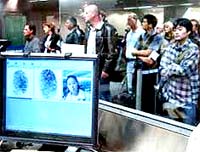
Foreigners arriving at US airports were photographed and had their fingerprints scanned Monday in the start of a government effort to use some of the latest surveillance technology to keep terrorists out of the country.
The program allows Customs officials to check passengers instantly against terrorist watch lists and a national criminal database.
The goal is to "make sure our borders are open to visitors but closed to terrorists," Homeland Security Secretary Tom Ridge said.
The changes came as the United States entered a third consecutive week on high alert for terrorism, including especially tight security involving foreign flights. Fourteen flights on British Airways, Aeromexico and Air France have been canceled or delayed since New Year's Eve because of security fears.
Under the new rules, travelers press their index fingers onto an inkless scanner and then have their photograph taken as they make their way through customs.
The security checks target foreigners entering the 115 US airports that handle international flights, as well as 14 major seaports. The only exceptions will be visitors from 27 countries -- mostly European nations -- whose citizens are allowed to come to the United States for up to 90 days without visas.
Also exempted will be most Canadians, because they usually are not required to get visas, and Mexicans who are coming into the country for a short time and not venturing far from the border.
The program, called US-VISIT, or US Visitor and Immigrant Status Indicator Technology, is expected to check up to 24 million foreigners each year, though some will be repeat visitors.
"America has been and will always be a welcoming country, but we will also be on guard," Ridge said at Hartsfield-Jackson Atlanta International Airport, where he greeted some of the first foreign passengers to pass through the system.
In a pilot program at Hartsfield-Jackson that preceded Monday's nationwide implementation, authorities turned up 21 people on the FBI's criminal watch list for such crimes as drug offenses, rape and visa fraud, Ridge said.
Homeland Security spokesman Bill Strassberger said that once screeners become proficient, the extra security will take 10 to 15 seconds per person.
Airport officials and passengers reported little fuss over the security checks, and many said they did not mind the extra steps if it meant safer skies. Passengers reported only minor delays, if any, in passing through customs checkpoints.
"We all want to go on a flight knowing we're going to arrive safely," said Layal Rashid, 22, a Cyprus resident who arrived at Chicago's O'Hare Airport on a flight from Frankfurt, Germany. "It puts your mind at ease to know that the security is stricter now."
But some foreign travelers were taken aback by the rules, and worried about a system that tracks their movements.
"We're not used to having our fingerprint and photo taken and it being filed. Who knows what they can do with that?" said Carlos Elizondo, who came to Dallas-Fort Worth Airport on a flight from Monterrey, Mexico.
Under the program, photographs go into a law-enforcement database that eventually will allow users to pull up photos of visa holders and make sure they match the person who is seeking to enter the country. The travel data is supposed to be securely stored and made available only to authorized officials on a need-to-know basis.
Foreigners also will be checked as they leave the country as an extra security measure and to ensure they have not overstayed their visa or violated other restrictions.
A similar program is to be installed at 50 land border crossings by the end of next year.
Nishith Shah, who arrived at Boston's Logan Airport from India, said he was comfortable with the process because it did not take long. But he said he hopes it does not lead to further restrictions on foreigners.
"Is it going to stop here?" Shah said.
(China Daily January 6, 2004)
|

